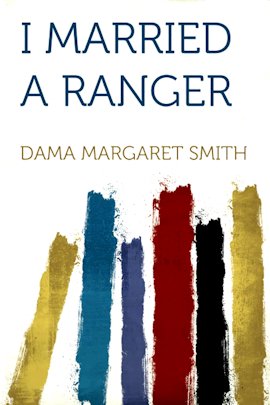We camped at Mooney Falls that night, so called on account of an adventurous
prospector of that name losing his life by falling over the ledge there. It took ten months for his comrades to get equipment together and recover his body, which
they buried at the foot of the falls. This place naturally holds no attraction for our Indian friends, and we had literally to push them from under our feet. They almost sat in the campfire, so determined were they to stay near us.
The next day we started to Hilltop, with Big Jim and his squaw with us as an escort of honor. Jim rode serenely along, while Mary trudged after on foot.
"Jim," said the Chief, "how is it that you ride and Mary walks?"
Jim's voice was reproachfully astonished that anyone could be so dense: "Mary, she no got um horse!"
The Indians gathered to see us off. I looked at the faces before me. Even the babies seemed hopeless and helpless. It is a people looking backward down the
years with no thought of the morrow.
"Can't you get them to be more hopeful or cheerful? Won't they even try to help themselves?" I asked Wattahomigie in desperation. He sadly shook his head.
"No help," he said; "plenty for today, maybe no tomorrow."
And maybe he's right. Not many more morrows for that doomed tribe.
Chapter Header
Chapter X: WHERE THEY DANCE WITH SNAKES[2]
A few days after our visit to Supai, Ranger Fisk dropped in.
"Going to the Snake Dance?" he asked me.
"What's a Snake Dance, and where is it?"
"Oh, it's over in the Hopi Reservation, and the crazy redskins hop around with rattlesnakes in their mouths so it'll rain."
"I don't believe that. I'm going over and ask Joe about it," I replied, indignant that Charlie would try to tell me anything so improbable.
I returned pretty soon from my visit to Joe, who is Chief of the Hopi Indians. He made his home with the Spencers at the Hopi House, and we were tried and true
friends.
"What did he say?" Both the Chief and Ranger Fisk hurled the question at me.
"He said rattlesnakes are their brothers and they carry messages to the rain gods telling them of the need for rain in Hopi land. He didn't want to tell me much about it. White Mountain, let's go. Please! "
So we went. But before we started I managed to gather a little more information
about the yearly ceremony that is held in the Painted Desert country. Joe told me that the Government at Washington was opposed to their Snake Dance. He told
me to bear in mind that water is the very breath of life to the desert dwellers, and that while his people did not like to oppose the agents placed there by the Government they certainly intended to continue their dance.
We loaded the flivver with food and water, since we knew our welcome would
be a shade warmer if we did not draw on the meager water supply in the Reservation. We dropped down to Flagstaff, and there on every street corner and
in every store and hotel the Hopi Snake Dance was the main subject of conversation. It seemed that everybody was going!
We left the main road there and swung off across the desert for the Hopi villages, built high on rocky mesas overlooking the surrounding country. It was delightful during the morning coolness, but all too soon the sun enveloped us. We met two
or three Navajo men on their tough little ponies, but they were sullen and refused to answer my waves to them. While we repaired a puncture, a tiny Navajo girl in
her full calico skirt and small velvet basque drove her flock of sheep near and shyly watched us. I offered her an apple and she shied away like a timid deer.
But candy was too alluring. She crept closer and closer, and then I got sorry for her and placed it on a rock and turned my back. She lost no time in grabbing the sweet and darting back to her flock.
The road was badly broken up with coulees and dry washes that a heavy rain would turn into embryo Colorados. I found myself hoping that the Snake Dance
prayer for rain would not "take" until we were safely back over this road.
Evening found us encamped at the foot of the high mesa upon which was built
the Hopi village where the dance would be held this year. Close beside was the
water hole that furnished the population with a scant supply. It was a sullen, dripping, seeping spring that had nothing in common with our gushing, singing
springs of the Southern mountains. The water was caught in a scooped-out place
under the cliff, crudely walled in with stones to keep animals away. Some stray
cattle, however, had passed the barrier and perished there, for their bones protruded from the soft earth surrounding the pool. It was not an appetizing sight. Rude steps were cut in the rocky trail leading to the pueblo dwellings above two miles away, from whence came the squaws with big ollas to carry the

























